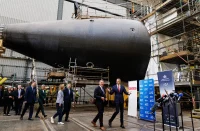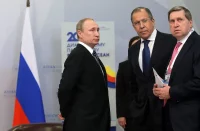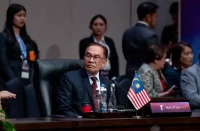«Today we’re partners, but not friends» – said Russian ambassador to Germany Vladimir Grinin meeting journalists from different countries in Berlin by the end of April. After many years of assurances that the both countries are strategic partners, the opinion mainly expressed by Russian politicians, one should welcome the more sober assessment of Russia-Germany relations. The Russian ambassador is right: no need to prevaricate and sugarcoat reality, even if the preparation for launching the «crisscross « years of Russia and Germany in June this year is in full swing. The program for 2012-2013 is devoted to the achievements of the two countries in the fields of economy, science, education, engineering and culture. Its purpose is to foster mutual understanding and trust. If it does, it’ll be a genuine success.
It’s lack of mutual trust that seriously hinders the development of relations between Russia and Germany as well as Russia’s relations with other Western countries. The Russia ambassador thinks it’s the main obstacle. Leaving diplomatic etiquette aside, Moscow rebukes the Western partners they don’t trust it enough. There is a deep defensive ditch being dug between Russia and the EU in place of the «iron curtain» that fell down twenty years ago. Is it not demonstrated by the fact that the talks about the renewal of the Russia-EU Partnership and Cooperation Agreement, that expired a few years ago, have somehow died away?
The crisis that the European Union is going through has slowed down the European policy towards former Soviet Republics with the «Eastern Partnership» program used as the main instrument of its implementation. But the substance of the policy is still the same: to distance the former Soviet Republics away from Russia, to «get them closer» to the West – that’s the goal specified in official documents. What is the role of Russia as these plans define it? Is it not a kind of a «buffer zone» between two superpower rivals against the background of growing China’s strength and the expectations that Washington will apply efforts to work out an integrated Western stance? What should Moscow do to oppose it? At least to fully realize what kind of threats it faces and not try to find comfort in illusions concerning limitless opportunities opened thanks to the «partnership» with the West.
Meeting journalists in Berlin the Russian ambassador expressed an opinion that the tragic results of World War II, when the Soviet Union lost 27 million of its citizens, still cloud over Russia-Germany relations. It’s impossible not to see the difference between this statement from what the diplomat had said before. Last year, at the reception devoted to the victory over fascism, V. Granin said: «Russia and Germany go ahead together bringing into life the ideas of good neighbor policy, partnership and cooperation setting an example of historic reconciliation of the two nations for the whole world». A year before that he said: «The countries have gathered the unique experience of historic reconciliation and develop strategic partnership targeted at the future. Together we solve the acute problems of today and stand up to new challenges and threats». By reminding the Soviet Union’s decisive contribution into the victory over German fascism, something they prefer not to remember in the West, the ambassador let know Russia was capable to meet the existing political threats with defensive measures. Moreover, the deployment of the US missile defense European component is not only seen by Russia as a proof of lack of trust towards it, but also as a direct threat as well. The Russia ambassador said Russia wanted guarantees the US missile defense, called a NATO system nowadays, would not be able to weaken its strategic nuclear potential that is destined to protect the homeland. If it becomes clear the NATO missile shield is aimed at Russia it will have to take additional measures to enhance the capabilities at strategic level to counter the threat. Russia must restore the capability of its strategic potential to defend the territory.
Tough enough, the stance is made clear. It meets the spirit of the Granin’s statement during the February (2012) security conference in Munich. And… there was no whatsoever response in the German media!
If you look through the main press outlets you’ll easily see the information about Russia is really scarce, mainly limited by the role of the Russian Federation in the management of the Syrian crisis. Frankfurter Allgemeine says: «We still need Russia» while commenting on the reconciliatory tone of the dialogue with Russia at the April G8 summit (the meaning is that «they» still need Russia to persuade China to make a compromise concerning the situation in Syria).
Unanimous silence of German media, like if upon somebody’s order, is a stance too, it’s a display of intent by the West to ignore the Moscow’s point of view on the missile defense. It’s understandable taking into consideration the prolonged weakness of Russia, including its dependence on export of raw materials that is well known worldwide. Russia is of no interest for the West as an ally: still when a concrete issue comes into focus, Russia is ready to meet the other side halfway. The transition points for international contingent in Afghanistan is not the only example. The response to the West appears to be of ambiguous character – it happened in the Soviet past. This kind of inconsistency was most evidently displayed right after the Federal Republic of Germany joined NATO. Besides the creation of the Warsaw Pact, the response included the break up of the agreements concluded during the war with Great Britain and France. A controversial reaction – it’s exactly the withdrawal from these agreements the Western politicians, who saw it as a dangerous leverage exerted by the USSR on Europe, called for at the time. The most surprising measure taken in response was the invitation to visit Moscow sent to Chancellor of the Federal Republic of Germany K. Adenauer. Having received it he plunged into deep thought if it was right to accept the invitation taking into consideration that his policy was aimed at utmost integration with the West.
To his surprise the visit was accompanied by abundant «friendly gestures». The apotheosis was setting free German former military prisoners serving sentences in the Soviet camps. The Germans welcomed their chancellor back as a hero, the visit became his unprecedented political triumph that assured his election victory two years after. It was an ambiguous «lesson» to the revanchists of the whole world. The history has a lesson of different character. In 1983 Y. Andropov made a statement in response to the deployment of US missiles in Western Europe making precise the countermeasures including the deployment of additional numbers of missiles in German Democratic Republic and Czechoslovakia, deployment of submarines etc. The consistency, accompanied by deeds, happened to be quite convincing and quickly brought about results: at the beginning of 1985 German Minister of Defense Volker Rühe and Minister of Foreign Affairs Hans-Dietrich Genscher spoke up for more definite recognition of the Oder-Neisse border line. The same year in May West German President Richard von Weizsacker delivered the famous speech when for the first time in history of the FRG he called May 9 the day of liberation for Germans.
No matter how limited are the Russia’s present options of giving response to the West, they should be confidently resorted to – or words shouldn’t be thrown to the wind. If reluctance to act is seen behind the threat made, like in case of NATO’s extension to the Baltic states, when Moscow said «no red line» was to be crossed but it was not supported by any steps – then the threat as well as the one who makes it are not taken seriously anymore.
At present Russia strives to intensify military-political cooperation within the framework of the Collective Security Treaty Organization, and the West has started to display concern about it. The prospects for the Eurasian Union is a matter of concern too. It caused it to hastily create the Berlin Eurasian Club in February 2012. The sessions are to be held annually in Brussels, Berlin and Astana. Neither Moscow, nor Minsk are invited to join the dialogue. That’s what German-style «Eurasian integration» looks like…
Source: Strategic Culture Foundation














Comments